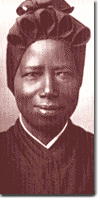Our Universal Sister

Our Universal Sister
St Josephine Bakhita, Our Universal Sister
A child of the Daju tribe of south-western Sudan, Bakhita was born around 1869 and she came from a well-to-do family. Her father was the brother of the village chief. He owned much land, with “plantations and cattle”, and had hired servants working for him. Home was a simple hut, mud-walled and millet stalk-thatched, but happy and loving, with parents, three brothers and four sisters, one of whom was Bakhita’s own twin.

All was lost to her when the slave trades kidnapped her when she was but seven years old. Stripped of the most fundamental human right – personal freedom and dignity – Bakhita endured physical, emotional and spiritual deprivation. There were long forced marches in slave caravans from Olgossa, her village, to El Obied and the slave markets there, then on to Khartoum, changing hands four times over a period of ten years. The little one, mockingly re-named Bakhita, “The Lucky One”, suffered loneliness and torture … the lot of the slave. Yet, even reduced to conditions inhuman, Bakhita always knew a certain sense of hope … in what or whom she could not say … then. But somewhere, she knew not how then, she found the strength to live each fearful, miserable, terror-filled day with courage.

Not even slavery, however, could destroy her natural sensitivity and gentleness, that quality of heart that knows compassion. In the midst of her own pain and suffering, and impotent as she was, she could still care about others, commiserate with them, be with them. The one who considered herself “a slave, and an object owned by her masters”, never took advantage of her masters’ property, even under the worst of circumstances and the greatest need. Slave duties were executed with responsibility and an innate sense of justice. Even before she came to know “the good of God”, she also sensed that there was a higher Power who was in control of every matter under heaven. Because she lived continually in the search of events unfolding around for so as to find the key to encountering this Power, her heart was open and ready when God revealed Himself to her. Whether it was simply offering a drink to a sister in community or a bowl of hot soup to the poor, watching over kindergarten children or tending the wounded during the war, every action was done with love, serenity and gentleness.

This trait she carried with her even when her path led her out of Africa to Italy, where by Divine Providence, she was baptised into the Catholic faith and later took her vows as a Canossian Daughter of Charity. One would expect that with all that she had undergone, Bakhita would have suffered severe emotional or psychological scarring. But the Madre Moreta, the “Brunette Mother” as she was affectionately called, was able to see in each painful wound, each traumatic memory, stepping stones in the path that led to God – hidden blessings every one. Hers was the gift of a “purified memory”, transformed and transfigured, experienced as a blessing.

This is why she was able to forgive her kidnappers and those who tortured her, why she bore no resentment towards them, and prayed with great passion for their well-being. As her relationship with the unseen God grew, so too did her capacity to enter into communion with God. She was able to see the hand of God in all the events of daily life and neither illness nor wars shook her serene, child-like trust that El Paron, The Master, was in command. Even as health passed and physical health failed, her spirit grew brighter and stronger. Prayer was spent in the company of One “who had waited so long for me”. A characteristic topic of her meditation was “Jesus: to know Him better, so as to love Him more and more”.

At the Canossian Convent in Schio, she was engaged in simple tasks in the kitchen, the needlework classroom, sacristy and as portress at the door. Enclosed, though she was, Bakhita’s ready availability and her welcoming ways to all endeared her to the people. She was ready to interpret actions of others in the beat of light possible and took reproaches of others respectfully. Above all, she had made peace with her past. For all who have been tried by conflict, wars and oppression, Bakhita leaves us the legacy of comfort and hope in a providential Father. She joins those who, from generation to generation, have followed Christ through trial and tribulation, and who now take their place in the Kingdom of God.

Awakening to the knowledge and love of God, her “Master” above all masters and her response in faith, love and gratitude, Bakhita left this world on 8 February 1947. She was declared “Blessed” on 17 May 1992, and proclaimed a “Saint” on 1 October 2000 in Rome.


